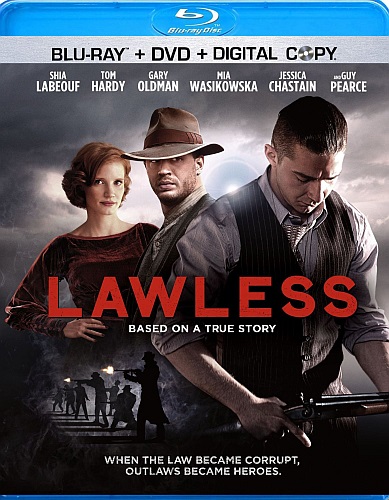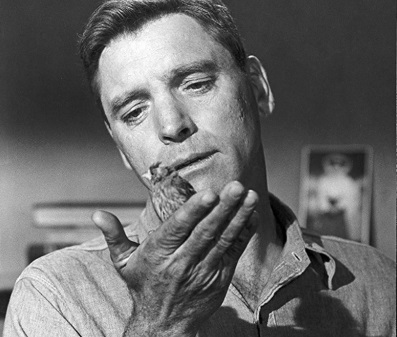Originally posted on 2/21/17
In one of my favorite movies, RUNAWAY TRAIN, an elderly railroad worker is ordered to derail an oncoming locomotive with no brakes when it reaches his point on the track. So the old guy pulls the switch lever, hurries back to his truck, and then relaxes contentedly with a cup of hot coffee and the words: "This is gonna be good!"
It was with the same sense of anticipation that I sat back to witness the trainwreck that is THE KLANSMAN (1974), and I must say I wasn't disappointed. It's the film equivalent of watching something bad happen and perversely enjoying every minute of it.
I'm not sure at what point the brakes burned out on this one, but it had to be somewhere along the time they hired Richard Burton to play a crusty old Southern gentleman with a limp and Italian bombshell Luciana Paluzzi as Trixie, the Southern-fried secretary to Lee Marvin's laconic smalltown lawman Sheriff "Track" Bascomb.
It helps that this deliriously lurid potboiler about the conflicts between redneck Klan yokels and the local black population in smalltown Alabama--exacerbated by an impending civil rights march that's drawing agitators from the big city--is one of the most circus-like conglomerations of blatant stereotypes ever thrown together into one steamy potluck stew.
Amazingly, this TV-movie-level production was helmed by none other than Terence Young, the man who directed the James Bond classics DR. NO, FROM RUSSIA WITH LOVE, and THUNDERBALL, as well as the Audrey Hepburn thriller WAIT UNTIL DARK, none of which this movie resembles in any way whatsoever. I must assume that Mr. Young boned up on the American South of the 60s and 70s by reading some Li'l Abner comics or watching a few reruns of "The Beverly Hillbillies."
Not that any of this is meant in a negative way, mind you. Bad movies are one of my weaknesses and this one is so incredibly, entertainingly bad in such a wide variety of interesting ways that it becomes an object of riveting fascination.
The film opens on the edge of town with both black and white spectators egging on a retarded black behemoth named "Lightning Rod" to rape a black woman for their enjoyment, which is broken up by spoilsport Marvin who tells everyone to go home.
Later, Linda Evans (Audra Barkley on "The Big Valley", here playing the role of "Nancy Poteet"), is raped by an unknown black assailant, which really stirs up them Klan boys and has them hopping into their pickups in lynch-mob mode and yee-hawing it up all over town.
They end up raping none other than Lola Falana's character Loretta Sykes, who's back from the big city to care for her dying mother. This time the honors are done by Cameron Mitchell as Marvin's hyper-redneck deputy "Butt Cutt" Cates, partly to get back at Burton's character who actually likes the black townsfolk and treats them decently, which, in them parts, is a big no-no.
It's a no-brainer that rolling around naked with a sweaty Cameron Mitchell on top of her can't have been one of the high points of Lola Falana's career. Other dizzying moments include David Huddleston's Mayor Hardy Riddle conducting a Klan meeting that's as comically absurd as an SNL skit, "Nancy Poteet" being run out of a church service because she's been "tainted" by her black rapist, and O.J. Simpson as an angry local named Garth creeping around with a sniper rifle and picking off white folks.
Lee Marvin makes his way through all of this as though wondering what the hell he's doing there, managing a passable performance while taking none of it any too seriously. Burton, arguably one of the finest actors who ever lived when the material was worthy of his talent, seems to be looking around for his paycheck most of the time. (I still love him.)
The rest of the rather incredible cast are into their roles to the hilt, with O.J. doing the angry young man in scary-convincing style and Cameron Mitchell giving us one of the most amusingly exaggerated Southern redneck characters this side of a Klan cookout.

Finally, after all the turgid buildup, director Young taps into some of that old Bond magic for a climactic gunfight between shotgun-totin' rednecks, O.J. and his sniper rifle, and Lee Marvin wielding a machine gun like he's back in THE DIRTY DOZEN, which is probably where he wished he was.
The DVD from Olive Films is 1.78:1 widescreen with mono sound and English subtitles. No extras.
Sometimes a racially-charged, tautly-suspenseful thriller like this is described as a "powder keg." THE KLANSMAN is like a powder keg of stupid, its fuse burning down in giddy anticipation ("This is gonna be good!") until the final blast of dumb fun leaves us dazed and amused.




















































